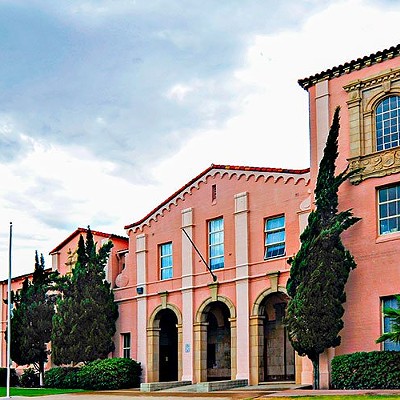Friday, January 11, 2013
MALDEF's Nancy Ramirez Discusses Recent TUSD Meeting and Deseg Process
On Tuesday, Jan. 8, after newly-elected Tucson Unified School District governing board members Kristel Foster and Cam Juarez were sworn in, Adelita Grijalva was voted in as president of the board and Foster as clerk. When the board returned from executive session, Grijalva did exactly what she said she would after last month's confusing meeting — she brought back a revote on the district's objection to culturally relevant curriculum (CRC) in the desegregation proposal released Dec. 10.
In a vote 3-2, the new board majority directed TUSD legal to file a withdrawal of the district's objection to CRC in the deseg plan. Where does the desegregation proposal stand now and what happen next? The Range recently talked with attorney Nancy Ramirez from the Mexican American Legal Defense and Education Fund (MALDEF), who continues to represent the Mexican-American plaintiffs from the almost 40-year-old deseg lawsuit.
Read the Q&A interview after the jump.
What are your thoughts about the TUSD governing board vote on Tuesday, Jan. 8?
We're very excited by the district's withdrawal of the objection. It indicates a new day for TUSD. There's a new governing board that is reflective and representative of the Tucson community. The Tucson voters elected Kristel Foster and Cam Juarez — who both supported MAS. I am very excited about the future and taking steps in the right direction to make sure all students are going to be benefiting from the USP and this new governing board.
During the Tuesday meeting, Stegeman commented that it could be late in the legal process because the deadlines set U.S. District Court Judge David Bury were month. Is this withdrawal of the CRC objection too late?
What's important is that the judge have accurate information in front of him. While our deadline for filing our objections was mid-December, as you know we had the holidays. There is a lot of information for the judge to sift through, and it is unlikely he's had sufficient time to review the unitary status plan, and all of the parties' objections and comments to objections, as well as special master's (Willis Hawley) comments. There are also the state objections and any underlined data, including all the appendices. The fact that it was filed in early January is a good thing and it shows a good-faith effort on behalf of the district to make sure that the judge has all relevant and accurate information before him.
What could keep Mexican-American studies classes from returning to TUSD at this point?
We are in a very good position. The school district's filing yesterday, this whole issue of CRC couldn't be in a stronger position than it is today. Not a single party in the lawsuit has objected to it, and as you stated the only entity that has objected is the state of Arizona, and they are not a party to the lawsuit.
There's a lot of discussion on federal trumps state, while another perspective is that this one issue could remain in the courts.
We are in federal court and we are in a desegregation case where there has been a constitutional violation of Latino and African-American students' right. So the court has the appropriate authority to institute culturally relevant courses, such as MAS and African-American studies in order to remedy the constitutional violation. This is separate and apart from the state saying “We are a sovereign state and you have to follow our laws.” Well, if you are opposing a court remedy to remedy a constitutional violation, than the federal court trumps the state law.
When you say, constitutional violation, what is the violation here?
Students were being segregated and they were not provided with equal education opportunities. That's the violation of the equal protection clause of the U,S. Constitution and that is the underlying cause of action in in the original complaint that was filed in the1970s. The court has found that that violation exists.
With fed trumps state in mind, does that mean there is a possibility that MAS is returning to TUSD without further litigation?
Absolutely it's a possibility and it is within the courts' hands at this point and time. If you're going to define very narrowly what would be a successful outcome … is that it has to be the exact same program that existed before with the same personal, etc., then that is not going to happen. What has been created in the plan is a framework to re-institute the courses that are culturally relevant that focus on the Mexican-American experience and there is a framework for hiring an individual who will oversee that program and the development of that curriculum who has experience in teaching those kinds of courses. So, it's not a mandate to go back and replicate exactly what was there before, but it is a mandate to create something that's going to be more extensive than the former Mexican-American studies program and that will provide the director of culturally relevant pedagogy and instruction a platform to do more than what the previous director of MAS was able to do. The new director is going to be in charge of not just teachers who are going to be teachers of MAS and African-American studies, but all teachers to be more sensitive and in tune with culturally-relevant instruction. I see the language in the plan as a bigger and better improved program than what was in place before.
There were changes the language of the final proposal released on Dec. 10. If felt like (special master) Willis Hawley listened to the community.
As not having been through this process in the case before, to see the responsiveness of the special master to the public input I thought was very honorable.
If the classes are to be reinstated, what will we see happen next?
As an attorney who has spent a lot of hours on this issue and negotiating it over the last year and in particular the last several months, I am extremely excited about the prospects of the plan, in particular the CRC. Obviously there is a process in place. We have to hear from Judge Bury. He's going to be considering the state's perspectives. It's possible the state could influence him and he can still make changes. But in terms of being poised and putting in front of a judge a proposal that we want him to adopt, I believe we are in the best position today that we could have ever been in in terms of having culturally relevant curriculum reinstated in TUSD.
What are the next things that need to be done for the deseg. process?
I can tell you that some of the activities are already underfoot. There are a number of deadlines that we are soon going to be hitting that are in the plan, a number in February and in March. The district and the parties are working together to meet those deadlines in anticipation that the court will be approving the plan. Granted we don't know for sure. (Bury) doesn't just have to stick to the parts that were objected to. He can say “I'm going to change this section even if nobody objected to it.” That's within his prerogative and authority to do so. We want to see all the parties have a vested interested in seeing this plan get implemented. We don't want to lose time because we've already lost a lot of time to begin with — the next steps to making sure we meet the initial deadlines that are there.
Will MALDEF remain involved as we move forward, once Bury approved the unitary status plan?
We will be apart of the process to see it through to the end at this point. Under the terms of the USP — it is supposed to be in place until 2017. It could change depending on the progress the district makes. If it doesn't make sufficient progress it's possible it could be extended, but as the attorneys for the Mendoza plaintiffs MALDEF will be continuing to represent that class of plaintiff until the end.
Tags: MALDEF , Mexican American Legal Defense and Education Fund , Nancy Ramirez , Willis Hawley , special master , David Bury , MAS , Mexican-American studies , African-American studies , Adelita Grijalva , Kristel Foster , Mark Stegeman , Michael Hicks , TUSD , Tucson Unified School District














